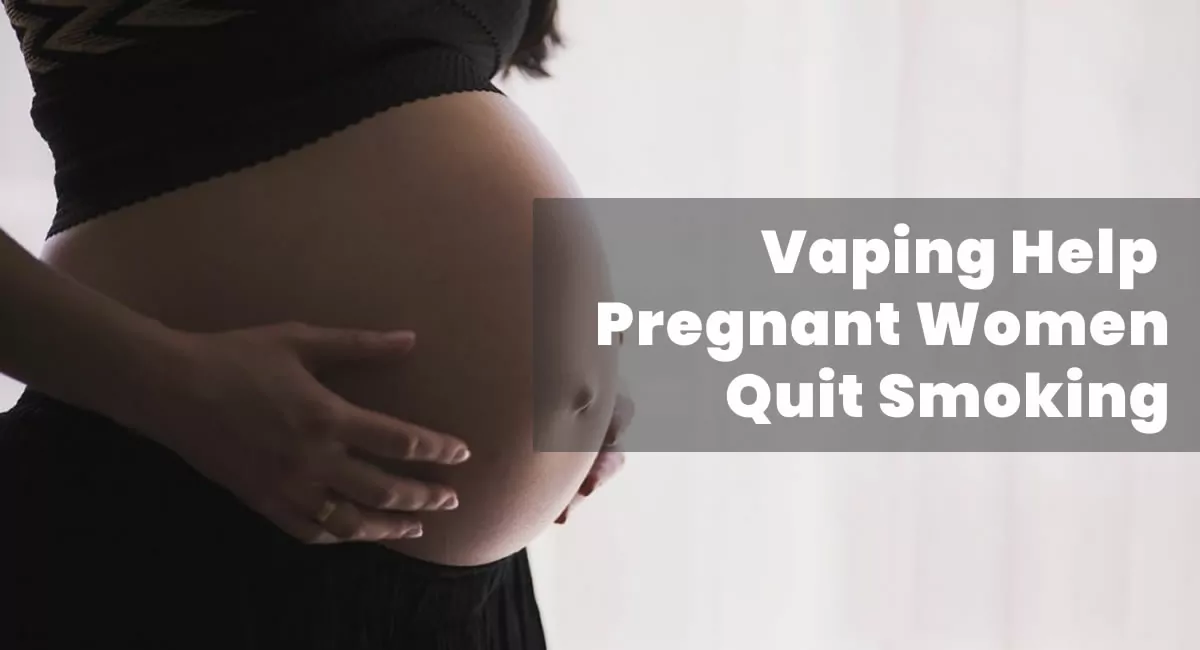Study Finds Vaping May Help Pregnant Women Quit Smoking Better Than Nicotine Patches

A new study from Queen Mary University in London suggests vaping may be more effective than nicotine patches in helping pregnant smokers quit.
Researchers also found vaping could lower the risk of having an underweight baby compared to smoking cigarettes. Low birth weight raises the chances of future health problems.
Most smoking cessation services currently recommend nicotine patches for pregnant smokers. But this study indicates vaping and patches are similarly safe during pregnancy. The key difference was a lower rate of low birthweight babies among the vaping group versus those using patches.
The scientists believe vaping simply helped more women stop smoking completely. Almost twice as many pregnant smokers quit with vaping rather than patches. Some women obtained e-cigarettes independently after being offered patches. This implies vaping was more appealing for smoking cessation.
“E-cigarettes seem better than patches for pregnant smokers to quit, leading to better outcomes,” says Professor Peter Hajek of Queen Mary University. “Current advice for smokers already includes switching to vaping. Now this recommendation can extend to pregnant smokers too.”
The specific effects of nicotine on fetuses remain unclear. The National Institute for Health and Care Excellence (NICE) believes toxins other than nicotine in cigarettes primarily cause risks. So they recommend nicotine replacement therapy like patches, gum, and sprays along with behavioral support.
A key benefit of vaping is it allows expecting mothers to select their preferred nicotine strength and flavors. This flexibility could make quitting smoking easier during pregnancy, the researchers say. More options with vaping may explain its advantages over patches and other nicotine replacements.
Smoking VS Vaping During Pregnancy
Smoking traditional cigarettes during pregnancy can harm the mother and baby. Risks include preterm delivery, stillbirth, low birth weight, and birth defects. Nicotine and carbon monoxide in cigarette smoke limit oxygen and nutrients for the developing fetus.
Quitting smoking is ideal. But nicotine addiction makes it extremely challenging. Nicotine replacement therapy including patches, gum, lozenges, and vaping can alleviate cravings and withdrawal. However, potential fetal risks from nicotine exposure remain.
The ingredients and contaminants in vaping liquids are also worrying. But vaping lacks thousands of chemicals in cigarette smoke. The reduced risks make vaping an appealing alternative for pregnant smokers struggling to quit.
While more research is required, evidence increasingly suggests vaping is less harmful than smoking during pregnancy. The study found babies born to vapers averaged nearly 1⁄3 pound heavier than babies of smokers (Low birthweight has been linked with poor health later in life). The Queen Mary University study had comparable findings.
Vaping May Improve Smoking Cessation Rates For Pregnant Women
The clinical trial by Queen Mary University of London evaluated vaping against nicotine patches. 679 pregnant smokers in England were randomly assigned patches or e-cigarettes plus counseling.
Around 37% of the vaping group stopped smoking by the end of pregnancy. Just 28% of patch users successfully quit.
15% of babies born to patch users had low birth weights compared to 6% for vaping. Low birthweight infants face higher risks of infection, developmental delays, and SIDS.
The researchers conclude pregnant smokers should receive counseling and the choice of nicotine replacements including vaping. Vaping could substantially increase their chances of totally quitting smoking during pregnancy.
Lead author Professor Peter Hajek affirms, “Healthcare providers can recommend e-cigarettes more widely as an alternative to smoking in pregnancy.”
Concerns Persist About The Unknown Long-Term Impacts Of Vaping
Despite the potential advantages over smoking, concerns remain about vaping’s long-term effects. E-cigarettes are too new to fully understand the health consequences, especially during pregnancy.
Unknown ingredients, contaminants, and varying nicotine levels in vaping liquids raise additional concerns. Manufacturers don’t have to disclose all ingredients. Standards and regulations for e-cigarette manufacturing continue to evolve.
While vaping seems less harmful than smoking, abstaining from both during pregnancy is ideal. However, vaping does appear to be an effective tool to help pregnant smokers quit.
- Guide to Quitting Vaping: Proven Strategies for Success - July 23, 2024
- TRPR and TPD UK Regulations for Vaping Devices and E-Liquids - July 23, 2024
- Guide to the New Tobacco and Vape Regulations in Romania - July 23, 2024
Related posts:
 Vaping, Smoking and the Fight for a Smoke-Free America: Where We Stand and Where We Go
Vaping, Smoking and the Fight for a Smoke-Free America: Where We Stand and Where We Go
 Understanding the Risks of Vaping During Pregnancy
Understanding the Risks of Vaping During Pregnancy
 Vaping Laws in Canada – Everything You Need to Know
Vaping Laws in Canada – Everything You Need to Know
 Vaping Laws in the U.S. by State
Vaping Laws in the U.S. by State
 The Latest Vaping Statistics for 2023: A Comprehensive Look
The Latest Vaping Statistics for 2023: A Comprehensive Look
 Australia Vaping Laws – Is Vaping Illegal in Australia
Australia Vaping Laws – Is Vaping Illegal in Australia


